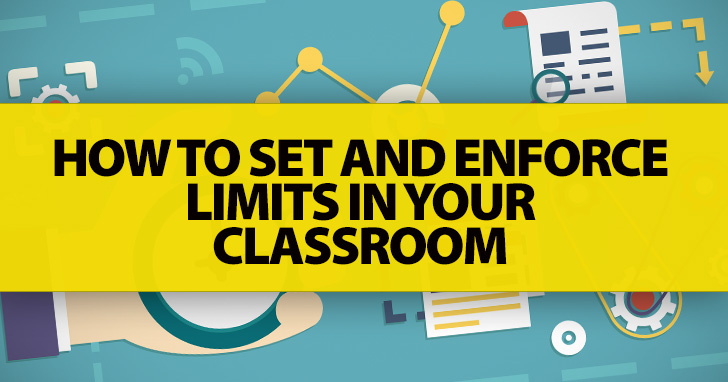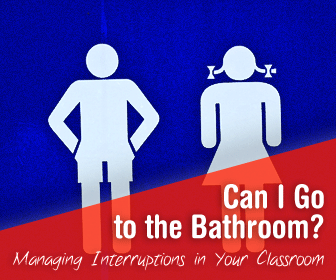This Isnít the Right Time: How To Set And Enforce Limits in Your Classroom


“Excuse me, Teacher?”
You are annoyed but pause long enough to ask, “Yes?”
“Can I go to the bathroom?”
There is scattered laughter. And the surprising thing is that this is not second grade, as you might be assuming, but rather a group of ESL adults. However, they may have had little previous formal schooling or come with widely divergent notions of what is appropriate classroom behavior. The other extreme of this situation is the student who pauses outside the door, waiting for the teacher to give permission to enter, when arriving late. Both of these behaviors are not quite appropriate for the situation, and in all likelihood the student in both cases just hasn’t been taught appropriate American classroom behavior, specifically when one may interrupt or intrude. The question then becomes which behaviors are most important to teach for the classroom, how to teach students methods to politely interrupt, and for the teacher to manage the interruptions in her class.

Every teacher is different; every classroom is different. Some teachers are bothered by students getting up to go to the restroom during class; others are not so bothered by it but are driven crazy by cell phones going off. Put what you would like students to do regarding “emergencies” needs to leave class and use of electronics in your syllabus so the expectation is clear from the start.
In the beginning, especially, expect there to be some challenging or misunderstanding of the expectations. Students may not have fully understood your rules, or they are so used to lack of rules in their other classrooms that they will continue to blithely receive calls during class or get up to leave during the lecture. Usually all that is required is for the teacher to remind the class in general of the expectations. Sometimes discussing the reason for the expectation also helps: so that we can concentrate on our studies, so that students can hear my lecture without confusion, and so forth.
Sometimes most of the interruptions come in the form of one student. You have just begun to introduce a topic, and the first sentence isn’t out of your mouth before her hand shoots up, and she begins talking—usually not on topic because she probably hasn’t been listening.
What to do about this kind of student? When she interrupts you while you are teaching, you may tell her kindly that you aren’t quite finished, and she may make her comment when you are finished. This rarely extinguishes the behavior on other occasions, however. I have found it helpful to meet with this student after class or during break to give additional attention because often the behavior results from some insecurity in the student—feeling older, or poorer, not as intelligent, etc., than the other students, and the feelings—whether or not they are a reality---cause the interruptions and need to seek attention in this way. If the instructor shows some positive attention and individual support of the student, the interruptions may diminish.
Sometimes the continual interruptions come from the same core group of students. This is a little harder to handle as confronting one of the group will make him or her feel singled out and defensive; if you try to meet with the whole group they may deny that they are acting as a group—which may in fact be true; they may be subconsciously patterning their behavior off one another. When there is a core group of students engaging in undesirable behavior, it usually indicates an overall problem with class climate, and the best course of action is for the instructor to address the class as a whole, reviewing your policies and expectations. In most cases, this will address the problem.
What if the interruptions are institutional in nature? Sometimes they are: your class time seems to be the time when the guys with the leaf-blowers get under your windows, or the custodian decides to come in and fix the pencil sharpener with a drill, or the tech folks have to come in and check the computers’ connectivity, etc. Even some colleagues are extremely social types and feel the apparent need to knock on your door for a quick chat or question while you are teaching. So what can we do in these instances?
Again, it’s fairly easy when it’s one person to simply say, “We’re in class right now. Please fix that/clean that/talk to me later.”
Sometimes, however, students become interested in the interruption, what the technicians are doing to the computers, for example, and I’ve allowed them to go over and watch for a short time. Sometimes the student who interrupts your lecture brings up a valid, if totally off topic, point, and it becomes a “teachable moment.” So if you can’t beat ‘em, join ‘em: sometimes the interruption to the class becomes the class. These are rare occasions, however. In most cases the class should be guarded against interruptions.
This is probably emblematic of how little regard our society has for the educational process: few people would interrupt a doctor when she’s talking to discuss some other totally irrelevant point, or take a quick phone call, or barge in (or out) of an exam room unpermitted; however, we feel free somehow to do this with teachers and the classroom. However, our students are given so little class time to begin with that teachers much jealously guard it against the continual interruptions.
How do you handle interruptions in your class?